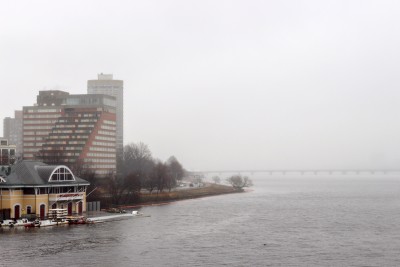
The U.S. Environmental Protection Agency will issue a stormwater general permit applicable to all cities and towns in Massachusetts in March to control pollutants entering bodies of water within the commonwealth, according to EPA spokesperson Dave Deegan.
This permit will require each Massachusetts community to develop a plan to control the amount of pollutants that enter the town’s storm drains. Deegan said the permit calls for a complete overhaul of how towns deal with stormwater coming from roads and other surfaces.
“The permit isn’t anything out of the ordinary, but rather an initiative to focus on the reduction of the presence of phosphorous found in abundance in stormwater runoff,” Deegan said. “We want to work with each community affected by the permit as they create a plan to reduce their discharge.”
Deegan described the permit process and how it will be implemented.
“The EPA is issuing this permit in the next four to six weeks,” Deegan said. “The permit requirements include the community’s plan to be implemented over 20 years, and will be funded by both federal and local government.”
Margaret Van Deusen, deputy director of the Charles River Watershed Association, said the permit is often thought of as a forced cleanup of the Charles River, which she says is misleading.
“It’s a general permit for stormwater … and is applied to all of Massachusetts,” Van Deusen said. “In the general permit, a section on Charles River Watershed specifically requires every community in Watershed to reduce its phosphorus discharge in the Charles.”
Van Deusen said the previous permit had expired in 2008, and this new version will be implemented in March.
“This permit is long overdue,” Van Deusen said. “It will affect the Massachusetts community as a whole by making the river a cleaner and healthier one.”
CRWA spokesperson Alexandra Ash explained the harmful effects of high concentrations of phosphorus.
“High amounts of the phosphorous in the stormwater gets fed to bodies of water all over the state,” Ash said. “They can contribute to toxic cyanobacteria blooms, which harm water quality, degrade wildlife habitat and limit recreational activities.”
Ash said the harmful nature of polluted water implies the importance of keeping the river clean.
“Harmful levels can lead to eye, ear and skin irritation in humans and pets,” Ash said. “This is why cleaning it up and preventing it is so important. So many live nearby the Charles or spend time on it, and we want to keep them safe.”
Several Boston residents said they were pleased with the ideas behind the new initiative, but were hoping for more government assistance in implementing the policy.
Lauren Fuller, 34, of the South End, said this type of government intervention is welcomed when it comes to the environment.
“With all of the recent news about unclean water, I think it’s very important for government intervention here,” she said. “If we’re cleaning up our water, it’s hard to see a disadvantage, obviously other than cost, which is always a factor in huge projects like this one.”
Vera Daniel, 58, of Back Bay, said she hopes the attention the new permit is getting will hopefully result in more support for keeping the river clean.
“If all of the communities in the Watershed work together, I can see positive change coming out from this,” she said. “The river is a part of Massachusetts … Ultimately, it should be about more than just stormwater. We should clean up all of the pollution.”
Ed Jacoby, 68, Beacon Hill, said the benefit might not be worth the cost of cleaning up the river.
“I’m not sure how I feel about this,” he said. “On the one hand, it’s a great idea to work on cleaning up the river. But on the other, it’s going to cost a lot no matter what plans they come up with, especially if it’s only focusing on one aspect of pollution.”




















































































































Jules • Feb 25, 2016 at 9:58 am
Check your spelling for consistency. “Phosphorus” is a noun. “Phosphorous” is an adjective.